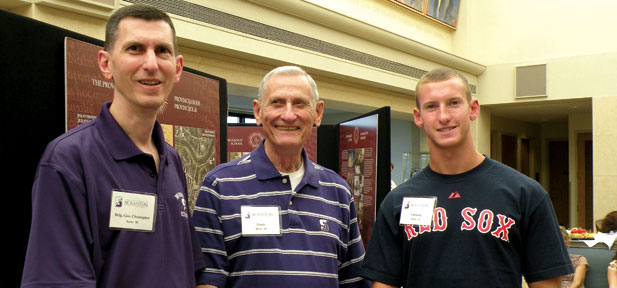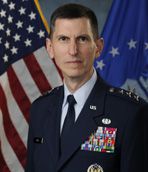The selection rate to get into the JAG Corps is less than 10 percent. Lt. Gen. Christopher Burne ’80, who was chosen for the elite corps more than 30 years ago, has always welcomed a challenge. “If you’re fortunate enough to be selected into the JAG Corps, the challenges come every day,” said the now Judge Advocate General of the U.S. Air Force in Washington, D.C. The three-star general was nominated by the President and confirmed by the Senate in May 2014, making him the 17th Judge Advocate General of the United States Air Force.
Lt. Gen. Burne’s daily trials (both in and out of the courtroom) have been varied and great. Over the course of his career, he constructed a legal office “from the sand up” in the United Arab Emirates during Operation Desert Storm; managed to leave the Pentagon unharmed on Sept. 11, 2001 and worked through some of the most salient issues of the day with military leaders and sometimes senior staffers on Capitol Hill and in the White House.
From Dunmore to D.C.
A successful career was formed from a happy childhood in Dunmore. His dedicated parents helped him with his homework at Washington No. 3 Elementary School on Green Ridge Street, checking his math and his grammar. They drove him to debate, yearbook and drama practices after school hours at Scranton Prep, and his mom fed him “delicious Italian meals seven days-a-week.” “I thank God for giving me the most wonderful and loving parents in the whole world,” he said. “They gave me everything I truly needed, most especially unconditional love and support and role models to always guide my path.”
His father, Francis Burne ’48, a decorated World War II Eighth Air Force B-24 bombardier, continues to inspire him. (Coincidentally, Lt. Gen. Burne’s first assignment was to an Eighth Air Force bomber base in Plattsburgh, New York.) Francis Burne’s Distinguished Flying Cross and Air Medals hang in Lt. Gen. Burne’s office. “His medals inspire me and remind me that my worst day in the Pentagon is better than even his best day in his B-24 surrounded by enemy flak and fighters,” he said.
In a recent issue of The Scranton Journal, Francis Burne delivered the kind of praise that his son has grown accustomed to: “My son is just one of the greatest people I’ve ever known,” he said.
It was thanks to his parents’ guidance that he decided to attend The University of Scranton. He was happy to stay close to home and thrilled to attend his dad’s alma mater. He was positive a Scranton education would give him the credentials to pursue his goal of law school (he eventually went to The Dickinson School of Law). “There is no better foundation for advanced academics and life’s challenges than a Jesuit-based education,” he said.
At Scranton he double majored in history and criminal justice, graduating magna cum laude. “Scranton’s professors and range of classes gave endless possibilities,” Lt. Gen. Burne said. He rounded out his experience by joining the drama club and working as entertainment chairman during new student orientations at the University. He also worked part-time as a police officer in Dunmore, gaining a “practical view of street-level law enforcement.”
Rise to the Top
He has since served in many legal adviser and leadership positions (at every level of command) and, in 1991, he was named Air Force Outstanding Judge Advocate of the Year. Prior to becoming the Judge Advocate General, he served as staff judge advocate for the Air Combat Command at Joint Base Langley-Eustis in Virginia. In his current position, he serves as the legal adviser to the secretary of the Air Force and the Air Force chief of staff, and oversees more than 2,200 judge advocates, 350 civilian attorneys and 1,400 enlisted paralegals and civilians around the world.
“My clients now are Air Force senior leaders, but the pace and range of issues has been like this since my first days in the military some 30 years ago,” said Lt. Gen. Burne. “It doesn’t matter if they have a stripe on their sleeve or a star on their shoulder, these are great Americans performing incredibly hard tasks in defense of our nation and they deserve the best legal advice we can offer.”
A Strong Family Focus

Lt. Gen. Burne may be meeting in the Pentagon, Russell Senate Office Building, or even on occasion in the West Wing during the day, but he’s very much a family man, as his own father was. After Sept. 11, he and his wife, Robin, who was in the Air Force Reserve serving within the Surgeon General’s Office, were working long shifts on the Crisis Action Team. “It was a difficult time for us, especially with two young children at home, but we knew what we were doing was important to our nation, and in that we found the strength to make it all work.”
“My wife has been a tremendous source of strength and assistance for nearly my entire military career. I would not be in the position I now hold without her love and daily support of me, of our sons and of our Air Force.” The couple was married in 1988, four years after the general received his Air Force commission. (Robin retired from the Air Force Reserve in 2011, holding the rank of colonel.)
Because of Lt. Gen. Burne’s military assignments, the family moved frequently, so the boys, Christian ’14 and Connor, were home-schooled through eighth grade. They both graduated as valedictorian of their high school class, an achievement their father attributes to their “God-given talent,” and the “perseverance of their mother,” who was their primary teacher. “I taught history, helped with research and writing, and threw a lot of baseballs… Robin taught everything else.” Both sons excelled academically and were captains of their varsity baseball teams and so ended up with many choices for college. Christian chose Scranton, and excelled as a presidential scholar and distinguished military graduate. He is now attending Penn State’s Dickinson School of Law.
“It hardly seems like 34 years have passed since I was dodging traffic crossing from the student center to St Thomas Hall… and Christian’s four years went by in the blink of eye,” said Lt. Gen. Burne. If the fortunate trend continues, The University of Scranton will be blessed to welcome another Burne son (or daughter!) on move-in day in 30 years or so, marking the fourth generation of the general’s family to attend Scranton since Francis Burne’s graduation some 65 years ago .
Lt. Gen. Burne Answers More Questions
 As the head of such a large agency, it must be difficult to control your own schedule. What’s that like and how is the pace?
As the head of such a large agency, it must be difficult to control your own schedule. What’s that like and how is the pace?
I had much more control of my schedule as a lieutenant or lieutenant colonel than I do as a lieutenant general! My day starts before 6 a.m. with reading and answering e-mail, then it's off to the Pentagon to attend meetings that range from strategy with staff attorneys to advice to the Secretary of the Air Force or Air Force Chief of Staff.
Issues range from Constitutional challenges such as those surrounding free religious expression versus establishment of religion to regulatory enforcement and from personnel and manpower issues to aligning a cutting-edge program by which victims of sexual assault are provided with their own military attorney to represent their interests throughout the prosecution of the accused offender.
My day ends around 11 p.m. with more e-mail, but I love the fast pace and I truly love serving my country by offering legal counsel to the outstanding members of the most powerful Air Force in the world.
How did you get where you are today?
I did well in the courtroom as a young prosecutor and also in our civil law fields of practice. I then had opportunities to practice operations and international law in deployed settings, as well as at U.S. Central Command and at a base in Europe. I was then given a series of assignments as a staff judge advocate (the top lawyer at a particular command).
The SJA jobs are the toughest because you are ultimately responsible for both the professional development of the assigned attorneys and paralegals, and for the legal services being provided to the leadership and all the Airmen at any particular location or throughout an entire command. But these types of leadership assignments are also the most rewarding.
I guess the colonels and generals who I worked for thought my work was worthy of promotion and more responsibility...but I never even imagined that one day I would wind up leading the entire JAG Corps.
What did you do during Operation Desert Storm?
I was the Staff Judge Advocate (SJA) for an aerial tanker wing. Our unit was located in the United Arab Emirates. We ate in tents, showered in tents, and my office was in a tent, all surrounded by lots of desert.
Our role was to ensure the members of our wing were "legally prepared" to fly their missions...sometimes that meant providing legal assistance by doing a will or power of attorney, sometimes that meant reviewing contracts to buy water or supplies, sometimes that meant negotiating with our host nation officials on operating procedures and security, and sometimes that meant assisting the commander with a disciplinary issue.
Tell me more about your role as a judge advocate on the Air Force Crisis Action Team.
I was in my fifth floor E-ring office when terrorists struck the Pentagon on 9-11. Thank God, my office mates and I all left the Building unharmed. Within a few days, I returned to the underground Air Force Ops Center as we assisted in the processing of mobilization orders and in reviewing countless documents for legal sufficiency in a domestic and international legal environment that was unlike anything we had ever encountered.
How have your parents influenced you/your life?
My mother and father had, as you might suspect, the largest impact on my development and continue to guide and uplift me to the present day.
From my birth until her passing last year, my mom devoted her whole life to me in everything she did...cooking, baking, playing, reading, ensuring my schoolwork was completed, everything.
My dad helped me understand the value of hard work and that nothing worth achieving can be reached by a shortcut. He would review my writing assignments, drive me to debate practice, and talk to me about life. And yes, there were also the stories of World War II...not big, grand accounts, but short, compelling descriptions of what he and his crew encountered.
They were my inspiration because I never wanted to disappoint them.
Tell me about your time/education at Scranton and how it affected your life/career?
At the U, I also was very involved in planning and executing the freshmen orientation for my sophomore through senior years, and was immersed in the drama club. I appeared on stage only once; my enjoyment came in the role of stage manager or, on a few occasions, house manager. I loved assembling a team to build the set, working with the director at the rehearsals, and then calling for all the lighting, sound and stage set cues as the production took place. All these things are nearly transparent to the audience, but complemented the talented students performing on stage, and made for some world-class productions.
All these things, from my academics to extracurricular activities to work experience made my University of Scranton days not only perfect preparation for law school (I graduated from Dickinson School of Law in 1983), and later graduate school (I received a Master's Degree in National Security Strategy from the National War College), but also for learning, adapting, leading and flourishing in the challenging military environment.


